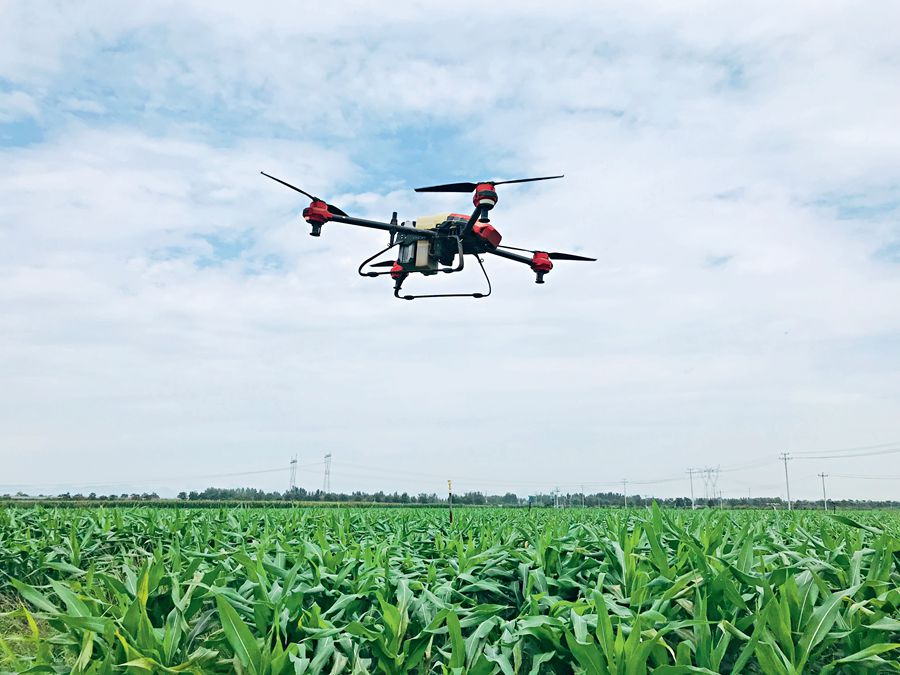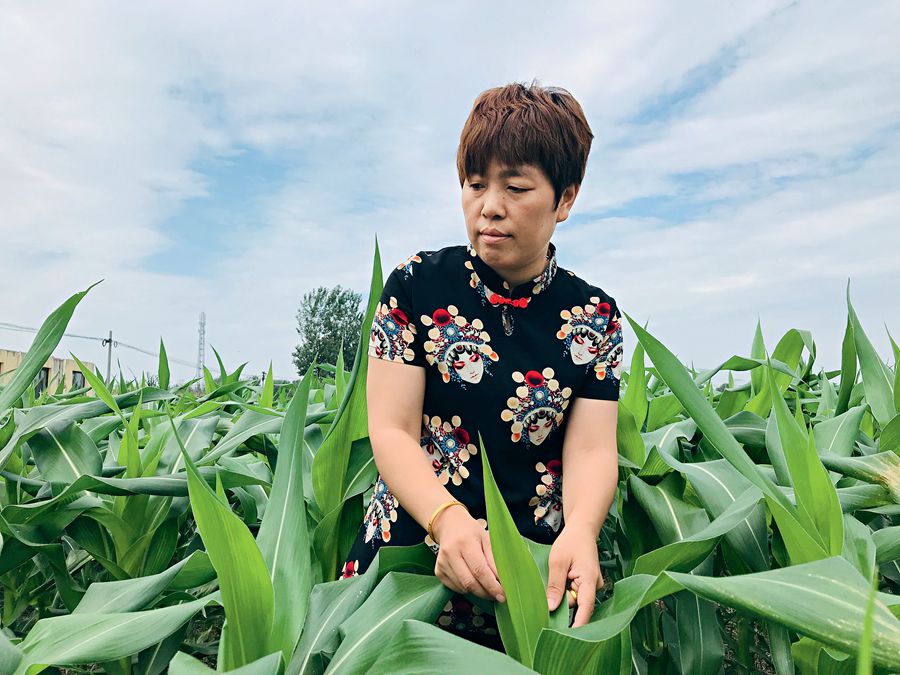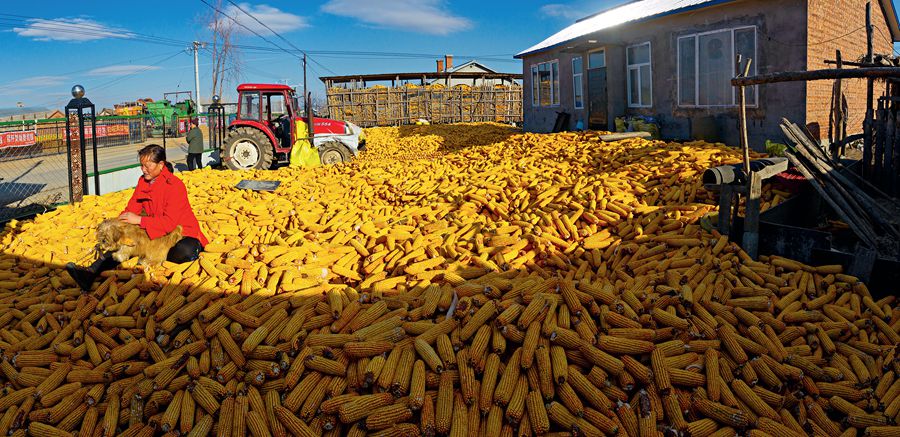SULTRY weather, having lasted for days on end, had helped snout moth’s larva breed on some corn stalks. A local villager, Zhang Lilong, came to her cornfield early one morning, intending to spray pesticides with a UAV (unmanned aerial vehicle).
Zhang is head of the Lilong Wheat Planting Specialized Cooperative. In 2003, she founded the cooperative in the village after bringing her migrant worker life to an end. Now as her cooperative grows and expands, she has earned a reputation in the county as a big grain supplier.
Last spring, while inspecting local spring ploughing in Laishui County, Secretary of the CPC Hebei Provincial Committee Wang Dongfeng lauded her as a representative of a new breed of skilled farmers for her entrepreneurship spirit and achievement.
A Rural Girl’s Dream
Zhang, 37, grew up in the countryside where she learned the hardships that farmers experience. “When it came to the wheat harvest season, the scorching sun beat down, seeming to parch all living things on the land. Farmers often worked whole days in the crop fields with a sickle in hand. Sweat drenched their clothes, which soon dried under the sun, then became sweat-soaked again. In rainy days, all family members would pitch in, toiling in the field for several days to have rush-harvest,” Zhang recalled.

Being more time efficient and labor-saving, unmanned aerial vehicles are promoted widely and rapidly in China for agricultural spaying purposes.
In school, Zhang learned the term “agricultural modernization.” She visualized the day when her village would realize agriculture modernization and then her parents would not have to toil in the fields. After graduation from middle school, Zhang, like many of her peers in the village, chose to work in the urban area as a migrant worker. Soon afterwards, she realized working for others away from home was not a life she wanted. Consequently, Zhang returned to her village, and opened up a store that sold seeds and chemical fertilizers. From then on, Zhang began to turn her attention to the country’s policies on agriculture, countryside, and farmers.
In 2012, Zhang learned the news from a radio broadcast that the government was encouraging farmers to set up a specialized planting cooperative and develop large-scale plantations. When she heard that news, the deserted land in her village immediately came to mind. “Back then, many rural young people were working in cities due to the meager income from traditional farming. With only seniors left in the village, many plots of sandy and unfertile land in the village were left deserted.”
Sensing the promising prospect, Zhang decided to collect the barren plots of land and develop scale planting. In early 2013, renting seven hectares of land from her fellow villagers with about RMB 400,000 pooled from her family and friends, Zhang started her entrepreneurial journey.
Hard-earned Money
However, entrepreneurship is always an adventure in which unexpected frustrations tend to crop up. In the first year, Zhang’s plan “alternating between wheat and corn plantation” sustained a deadly blow. A hailstorm destroyed all the corn crop in its crucial growing period, leading to losses of hundreds of thousands of yuan. After that, Zhang’s parents and husband tried to persuade her to drop the planting plan. However, her unfulfilled dream prodded her to hold on. She believed in the bright future of modern plantation.

Zhang Lilong is head of the Lilong Wheat Planting Specialized Cooperative.
The next year, Zhang made a decision to mortgage her house for a bank loan of RMB 370,000, a decision that her fellow villagers just could not understand. With the money, she gathered another 27 hectares of land. The saying that the diligent will always be rewarded was certainly true for her. The end of the year saw Zhang rake in a net income of RMB 200,000 from planting. Zhang has never had her cooperative in the red after that.
Zhang said her money was hard won. Despite all these years of improvement, being a farmer is still a toiling vocation.
In the harvest season of 2015, rainy days came. However, Zhang’s 27 hectares of sweet corn couldn’t afford a delayed harvest as over-ripe corn cannot find buyers. Then, braving the rain, Zhang organized workers to conduct a rush harvest. As rain boots get easily stuck in the mud and are hard to get free, they made it hard to plod in the field. Barefoot, workers toiled in the field, and got totally drenched in the end.
Zhang is determined to free farmers from backbreaking toil, which was exactly the motivation for starting her cooperative. “Modern agriculture is not intangible. What I’ve sought is to turn my dream, which I have cherished since I was a child, into a tangible reality,” Zhang said.
First Taste of Success
“Zhang Lilong is the youngest one among all our agriculture cooperatives’ heads, and the only female. However, her specialized wheat cooperative is the largest in scale here and also the one that has the highest net income,” the agriculture chief of Yi’an Town Yan Jiandong told China Today.
Six years of agricultural operation shaped Zhang into a dab hand in wheat and corn planting. She was not satisfied with that. To improve the added value of planting, Zhang purchased a sprinkler irrigation system with RMB 10,000.
According to Zhang, the sprinkler irrigation system can make better use of the land as the canals and ditches traditionally used for irrigation can be converted into farmland in addition to saving more than one third of the water compared with traditional methods. Based on Zhang’s calculation, the money to buy the irrigation system can be earned back within a year, as the electricity cost for sprinkler irrigation is RMB 225 per hectare, in contrast with RMB 375-525 for traditional irrigation.

Corn is one of the traditional staple grains in north China. Its harvest often serves as a barometer for the overall situation of the country’s grain production.
In the following years, Zhang purchased two UAVs, five rotary cultivators, five straw pulverizers, five sowers, and five harvesters in succession. According to Zhang’s calculation, the agricultural machines can reduce planting cost by about RMB 4,500 per hectare at most. As Zhang’s operation sets an example for local farmers, the county’s agriculture bureau has equipped her cooperative with more than RMB 1 million worth of modern agricultural equipment.
Scale and mechanized planting has freed workers in Zhang’s cooperative from exhausting labor. At present, the average annual income of the four permanent workers in the cooperative can reach RMB 26,000; for the 30 temporary workers, it stands around RMB 10,000. “Now, farming has become much easier. Approaching the age of 70, with the help of machines I can easily conduct the tasks of sowing and harvesting,” said Zheng Jinjiang, a worker of the cooperative who rents his land to Zhang. He can earn around RMB 30,000 in total every year.
Like Zheng Jinjiang, the 12 poor households in the village also rent their lands to Zhang. Twenty-three members of these households work at her cooperative, earning an average annual income of more than RMB 24,000. Zhang is now operating 73 hectares of land in the village.
The Future of Modern Farming
Years of cooperative running experience have made Zhang firmly believe that farming is a most promising vocation. Now, her dream has gone beyond the planting mode of corn alternated with wheat. She expects more breakthroughs in the development of her cooperative.
“Waxy corn will come into season on October 15. Then comes the sowing period for winter wheat. I plan to have a trial planting of triticale that is rich in selenium in a field of seven hectares this year. If it turns out good, I’ll grow more next year,” said Zhang. With the high nutritional value, triticale rich in selenium promises a lucrative industrial chain involving planting, processing, and selling. Zhang even registered a brand for her triticale flour.
To make full use of the vast amount of corn stalks, Zhang is planning to raise ostriches. “This autumn, our workers will collect stalks from fields and process them into feed for ostriches. In this way not only will stalks be recycled, but pollution will also be avoided. Moreover, ostrich manure can be used as fertilizer. Ostrich eggs, meat, and feathers can also bring the cooperative a sizable income.” Zhang’s plan has gained much support. Now, she has achieved a bank mortgage loan of RMB 600,000 and gotten a plot of land of 0.67 hectare via land transfer to serve as an ostrich breeding ground. She booked 30 breeding birds and 40 young birds.
Recent years have seen diversified forms of farmers’ specialized cooperatives, which cover a growing range of sectors and an extending industrial chain. At the end of 2016, registered cooperatives in China totaled 1.8 million, involving 44.4 percent of farming households in the country, which has greatly fueled the sound and rapid development of China’s agricultural sector.
Zhang’s cooperative reaped a bumper harvest of wheat in the first half of this year, and is expecting a steady corn output for the second half of the year, which will send its net income up to RMB 500,000. “Cooperative farming is definitely a trend for modern agricultural development. With more support policies rolling out, I believe farming will become an admirable career,” Zhang said.


